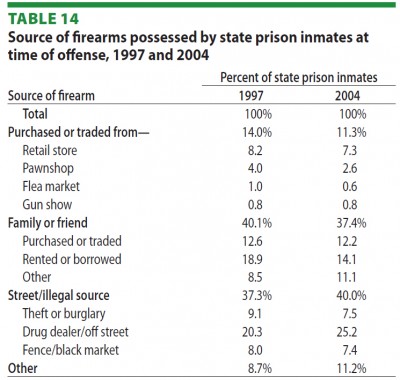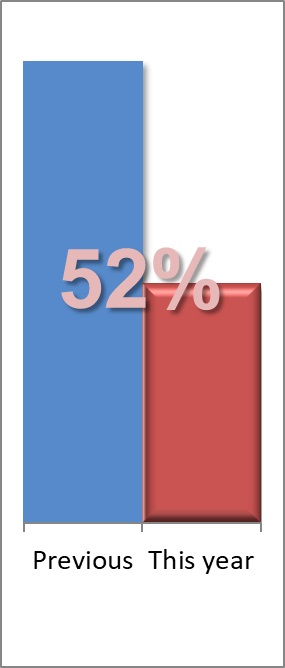Universal Isn’t
Universal background checks aren’t and cannot be, which makes them a horrible ruse and a social abuse.
How “universal” background checks are sold to the public
Akin to the now completely discredited “gun show loophole” canard, “universal” background checks are sold as a crime prevention measure. Various gun control groups have made it their current cause because it polls well with voters … until voters are presented with the perspective about guns and violent crime.
The idea being sold is that (a) every firearm transaction needs to be approved by the government using (b) a personal background check to assure the buyer isn’t a felon or other prohibited person. This allegedly will (c) reduce violence with guns.
The problems, as you will shortly see, are that (1) the solution is nowhere close to being universal, (2) will have no impact on gun violence, (3) is ripe for governmental abuse and (4) can’t work without one extra component … one that polls show voters openly reject.
Who wouldn’t comply
“Universal” background checks require universal participation. So an intelligent person would first ask “who would not participate once this law is passed?”
The answer is at least 40% of people who misuse guns, and upwards of 78%.
 The Bureau of Justice Statistics (BJS) tallies crimes involving guns in their decadal reports titled “Firearm Violence.” In that report, the BJS lists how offenders got their guns. This is our first clue to the non-universal nature of passing background checks.
The Bureau of Justice Statistics (BJS) tallies crimes involving guns in their decadal reports titled “Firearm Violence.” In that report, the BJS lists how offenders got their guns. This is our first clue to the non-universal nature of passing background checks.
According to the BJS, a full 40% of crime guns are acquired from completely off-the-radar sources. Most (25%) come from “drug dealer/off street” sources, at the nexus of street gang culture. Another big chunk (7%+) are stolen directly by thugs, and an equal amount are from street dealers, the fellows who vend hot guns from the trunk of their cars.
Ponder this for a moment: 40% of crime guns are acquired from and by people who have zero interest in obeying any law whatsoever. None. Zip. Nada. This is the largest category for crime gun sources according to the BJS, and it is the one that “universal” background checks will have zero impact upon. At best such laws would be impotent.
But the news gets worse.
The next 38% of crime guns come from people classified as “family or friend.” The definition of “friend” in such transactions is very broad and includes such buddies as:
- Drug users or dealer swapping contraband for weapons
- Women who knowingly perform strawman purchases and give guns to felon boyfriends
- Relatives who loan a gun to a felon for “self-protection”
Again we must ask how many of these people would drop whatever they are doing, drive untold miles to a gun store, file paperwork, and wait for a background check before handing a revolver to the other person. Since BJS does not itemize which type of “family” or “friends” are involved, we’ll have to assume some portion of this 38% of crime guns are not tied directly to nefarious people. But since we know from other criminology literature that people within criminal enclaves, or who routinely associate with violent criminals will bend the rules more readily than others, I suspect the majority of this 38% of crime guns come from people who also won’t bother with “universal” background checks.
So, the best case scenario is that 40% of crime guns won’t be caught with “universal” background checks and as much as 78% will slide by undetected. Incidentally, less than 1% of crime guns are acquired at gun shows … likely due to the high presence of cops and ornery NRA types at such events.
The expected outcome vs. the advertised one
We have a disconnect between the advertised purpose of “universal” background checks and what will actually occur.
The advertised purpose is to end transfers of guns to criminals, but we see that a minimum of 40% of such transfers come completely from black market operations. Hence, the proposals are impotent – they cannot achieve what they propose. Given that upwards of 78% of crime guns would not be impacted by “universal” background checks, such laws become a monumental waste of time …
Unless there are other objectives.
Define “prohibited” person or “transfer”
In much of the language of these bills, which differ from state to state, the definition of who is a “prohibited person” and a “firearm transfer” is ill defined on purpose.
It is obvious that prohibited persons would include people with felony convictions for violent crime. But the San Francisco Sherriff is apparently guilty of violent spouse abuse. In many places he would be on the prohibited persons list.
Another example may hit closer to home. A friend of mine volunteered to be part of a mutual restraining order after his ex-wife committed assault on him. Yet under the laws of his state today, he would not be allowed to borrow his father’s hunting rifle due to this ancient restraining order.
Danger lies is who is defined as a prohibited person. The definition can be lax, fluid, amended, open to judicial interpretation and vary across county borders. This may be the intent of some gun control groups who have a stated purpose of making gun ownership as complicated, difficult and expensive as possible.
The other intentional gotcha is what the definition of “transfer” may be. In the first state to pass “universal” background check legislation, the wording was such that if a friend admired your new Glock while standing in the adjoining alley at the firing range, and you handed it to him for inspection, then you became an instant felon. Gun control advocates claimed that would never happen, but they also claimed firearm registration would never lead to confiscation before the confiscations began in New York, Washington D.C., Chicago and California. Poorly worded legislation is an endangerment to decent people and no barrier to evil ones.
In the case of Michael Bloomberg, it is downright helpful.
Lastly, such “universal” background check laws are useless without universal run registration. Some contend this is the end game of the “universal” background check movement. Since the public openly rebel at the suggestion of gun registration (voters are smarter than politicians give them credit for), one gambit might be to pass the otherwise popular “universal” background check law and either (a) turn it into a state-level registration process or (b) later claim the background check law is not working “well enough” and that a tiny additional piece of legislation is needed, and it won’t be called “registration” though in reality it is.
Legislation must have efficacy, otherwise it is abuse
For a law to be of any use it must be effective and enforceable. If 40%+ of crime guns come from unregulatable sources, “universal” background checks have no efficacy at all. The only enforcement then comes from add-on charges after a crime (“You are charged with first degree murder and not filing background check paperwork … how do you plea?”). It is also enforced in order to harass honest people who simply want to lend a gun to a daughter in danger or an uncle who wants to go hunting, or to sell a spare revolver to the same neighbor who baby sits your kids.
This is not of what America is made.


Even though the Table 14 shows 2004 data, I see that its from the latest 2013 report, http://www.bjs.gov/content/pub/pdf/fv9311.pdf, so its not your fault this is 2004 data. Most likely, as they tighten the laws, this 40% number will increase.
You’ve made a huge point.
So what’s the solution? Making it easy for bad guys to get the guns legitimately doesn’t help anyone, but how do you stop the illegal trade?
John…
The same way we do with illegal drugs. This is the honest answer.
You can not live a risk-free life. Even if we could somehow do away with all guns, you would still be in danger from violent knife crime.
Consider: entire wars were fought before guns. Violent crime does not rely on guns, but instead on people who want to commit violent crime.
It is quirky that the BJS report presents 1997-2004 data. But I decided to triple check, and the May 2013 report has that table. That being said, the 2002 BJS “Firearm Use by Offenders” report has a similar table showing 1997, and the percentages were not materially different (39.6% for friends/family and 39.2% for street sources).
As to the appropriate cure, I think we have to address the motivation for criminals to have and use guns. Changing gang-related inner-city learned behavior is a very tall order, but it is the root cause of the most addressable gun violence.
Though I don’t have the funding (and hence the time) to perform a complete analysis, I deeply suspect addressing repeat violent offenders is the long-term approach. It was tried in California via both the 10-20-Life and Three Strike laws, and the effect appears to be amazing.
http://www.gunfacts.info/blog/understanding-californias-crime-collapse/
If the BJS were to repeat these surveys today, I don’t believe the results would be that much different.
Here’s a study that was just released by a college professor from the University of Chicago who asked convicts specifically what type of gun, where did you get it, and why did you choose that source. No surprises, unless you get all your gun news from Moms Demand.
http://chicago.suntimes.com/news/7/71/915770/university-chicago-survey-finds-crooks-get-guns-from-pals-dont-keep-them-long
I agree about the stats not changing much.
The BJS had another report (“Firearm Use by Offenders, 2002) that had data from both 1991 and 1997. There was a significant shift from 1991 to 1997, but in that time violent crime was dropping, NICS was in works, California pass the 10-20-Life law, etc.
The assumption is that criminals changed there MO and started doing more business through “friends/family” because crime gun purchases at retail declined as “friends/family” acquisitions increased.
After 1997 the stats stayed stable until the 2004 data, which as you say would likely remain the same today.
We have very effective, strict gun laws in this country. What we do NOT have are prosecutors who will prosecute gun criminals to the fullest extent of the law. And in those instances where the gun criminals are prosecuted, sitting judges do not give out maximum sentences. Politicians who scream for more gun laws don’t know what laws are currently on the books! Right now the easiest thing to do is just vote Republican so we can keep President Donald J. Trump in the White House, regain control of the House of Representatives and keep control of the Senate. Then President Donald J. Trump can do his job.